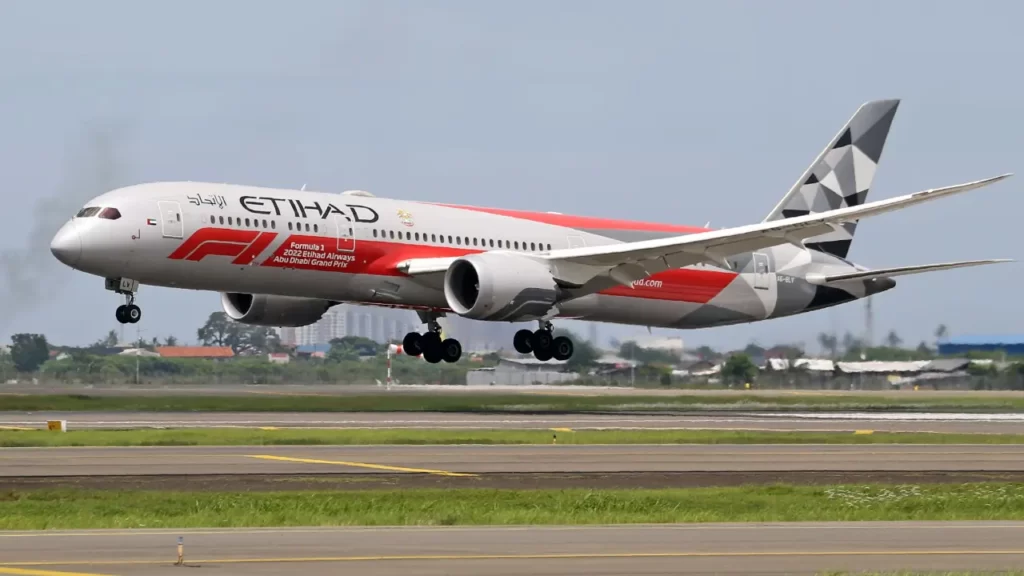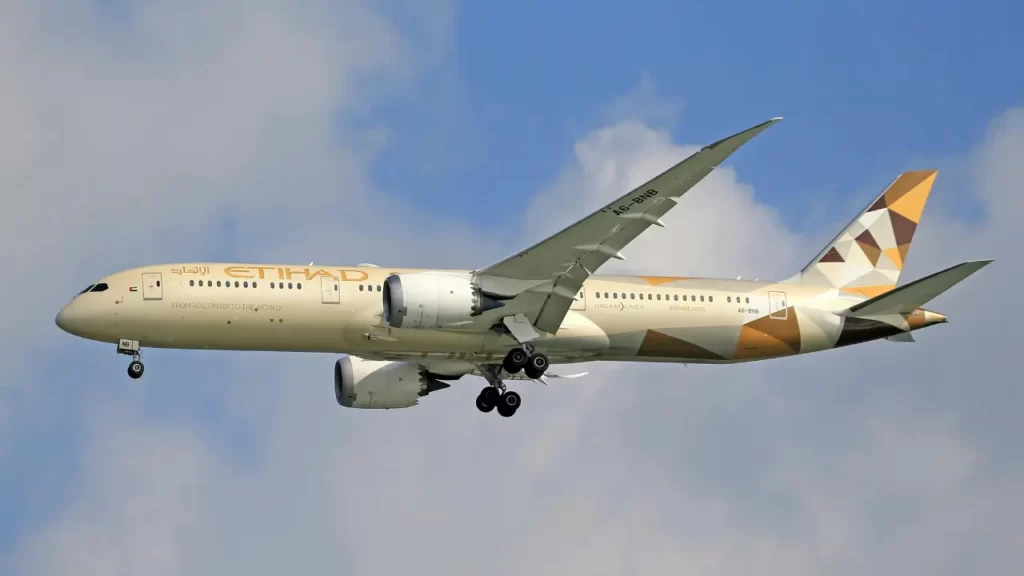
Etihad Airways Overview
Etihad Airways is the national airline of the United Arab Emirates (UAE) and is known for its luxury facilities and extensive global network. Here’s an indication of Etihad Airways.
Table of Contents
Establishment and Commencement of Operations (2003)
Etihad Airways was established in July 2003 and commenced processes on November 5, 2003. The airline is owned by the administration of Abu Dhabi, one of the seven emirates of the UAE.
Hub and Network
Etihad Airways operates from its main hub at Abu Dhabi International Airport (AUH). The airline has built a comprehensive global network, connecting passengers to destinations across six continents. Etihad has been a key player in positioning Abu Dhabi as a major international aviation hub.
Fleet
Etihad Airways operates a contemporary and diverse fleet of aircraft, including wide-body jets like the Boeing 787 Dreamliner, Boeing 777, and Airbus A380. The airline has invested in fuel-efficient and advanced aircraft to enhance operational efficiency.
Cabin Classes
Etihad Airways offers multiple cabin classes, including Economy Class, Business Class, and First Class. The airline is known for its luxurious premium cabins, featuring fully-flat beds, fine dining, and personalized service.
In-Flight Entertainment and Connectivity
Etihad delivers passengers with a range of in-flight entertainment options, including movies, TV shows, music, and games. Some airplane are equipped with Wi-Fi for in-flight connectivity.
Partnerships and Alliances
Etihad Airways is not a associate of a worldwide airline alliance but has built strategic partnerships with numerous airlines universal. The airline’s equity stakes in other carriers, such as Air Serbia, Air Seychelles, and Jet Airways (prior to its cessation of operations), have strengthened its global reach.
Etihad Guest Loyalty Program
Etihad operates a frequent-flyer program called Etihad Guest, allowing members to earn and redeem miles for flights, upgrades, and various travel-related benefits. The program also offers partnerships with other airlines and non-airline partners.
Luxury Experiences:
Etihad is renowned for its commitment to luxury travel. The airline’s premium cabins feature high-end amenities, including luxurious lounges, onboard chefs, and innovative designs for enhanced passenger comfort.
Environmental Initiatives
Etihad Airways is committed to sustainability and environmental responsibility. The carrier has implemented measures to decrease its carbon footprint, improve fuel efficiency, and explore biofuel options.
Innovation and Technology
Etihad has embraced technological advancements in the aviation industry, incorporating the latest technologies for operational efficiency, passenger services, and overall travel experience.
COVID-19 Pandemic Response
Similar to other airlines, Etihad faced challenges during the COVID-19 pandemic. The airline implemented safety measures, adjusted its flight schedules, and introduced health protocols to ensure passenger and staff safety.
Awards and Recognitions
Etihad Airways has conventional numerous awards for its services, including recognition for its premium cabins, in-flight entertainment, and general passenger experience from reputable organizations in the aviation industry.
Etihad Airways History

Formation and Inauguration (2003)
Etihad Airways was established by a regal decree of the Emirate of Abu Dhabi on July 3, 2003. It officially began processes on November 5, 2003, with an inaugural flight from Abu Dhabi to Al Ain.
Rapid Growth and Expansion (Mid-2000s)
In its early years, Etihad experienced rapid growth, expanding its network of destinations. The airline aimed to position Abu Dhabi as a major global aviation hub and gateway to the Middle East.
Inaugural Long-Haul Flights (2004)
In 2004, Etihad launched its first long-haul flights to destinations such as Brussels and Toronto, marking a significant expansion beyond the initial regional focus.
Introduction of Wide-Body Aircraft (Mid-2000s)
Etihad introduced wide-body aircraft, counting the Airbus A340 and Boeing 777, to its fleet to support its growing long-haul processes.
In-Flight Services and Luxurious Cabins (2006)
Etihad gained recognition for its commitment to luxury travel. In 2006, the airline introduced its first-class “Diamond Zone” cabins, setting new standards for in-flight services and passenger comfort.
Partnerships and Equity Investments (2009 Onward)
Etihad pursued a strategy of forming partnerships and acquiring equity stakes in other airlines to strengthen its global reach. Partnerships included Air Seychelles, Air Serbia, and a substantial equity stake in Jet Airways (India).
Introduction of the Airbus A380 and Boeing 787 (2014)
Etihad introduced the Airbus A380 and Boeing 787 Dreamliner to its fleet in 2014, offering enhanced comfort, advanced technology, and fuel efficiency.
In-Flight Chef and Culinary Services (2016)
Etihad further enhanced its premium cabin experience by introducing an in-flight chef service, allowing passengers to customize their meals. The airline focused on providing a gourmet dining experience at 35,000 feet.
Opening of the Abu Dhabi Louvre (2017)
Etihad celebrated its role in promoting cultural exchange by flying the first passengers to the newly opened Abu Dhabi Louvre museum in 2017.
Challenges and Restructuring (2018 Onward)
In the following years, Etihad faced financial challenges, partly due to issues with its equity investments, including the collapse of Jet Airways. The airline underwent a restructuring process to address financial concerns.
Response to the COVID-19 Pandemic (2020s)
Like many airlines, Etihad faced significant challenges during the COVID-19 pandemic. The airline implemented safety measures, adjusted its flight schedules, and introduced health protocols to navigate the impact of the global health crisis.
Focus on Sustainable Aviation (2021 Onward)
Etihad has placed an increasing emphasis on sustainability and environmental responsibility. The airline has traveled initiatives to reduce its carbon footprint, improve fuel competence, and contribute to the development of maintainable aviation practices.
Etihad Airways has played a crucial role in transforming Abu Dhabi into a major international aviation hub. Its focus on luxury, innovation, and strategic partnerships has contributed to its prominence in the global airline industry. The airline continues to adapt to changing market conditions and work towards a sustainable and resilient future. Please note that developments may have occurred since my last update.
